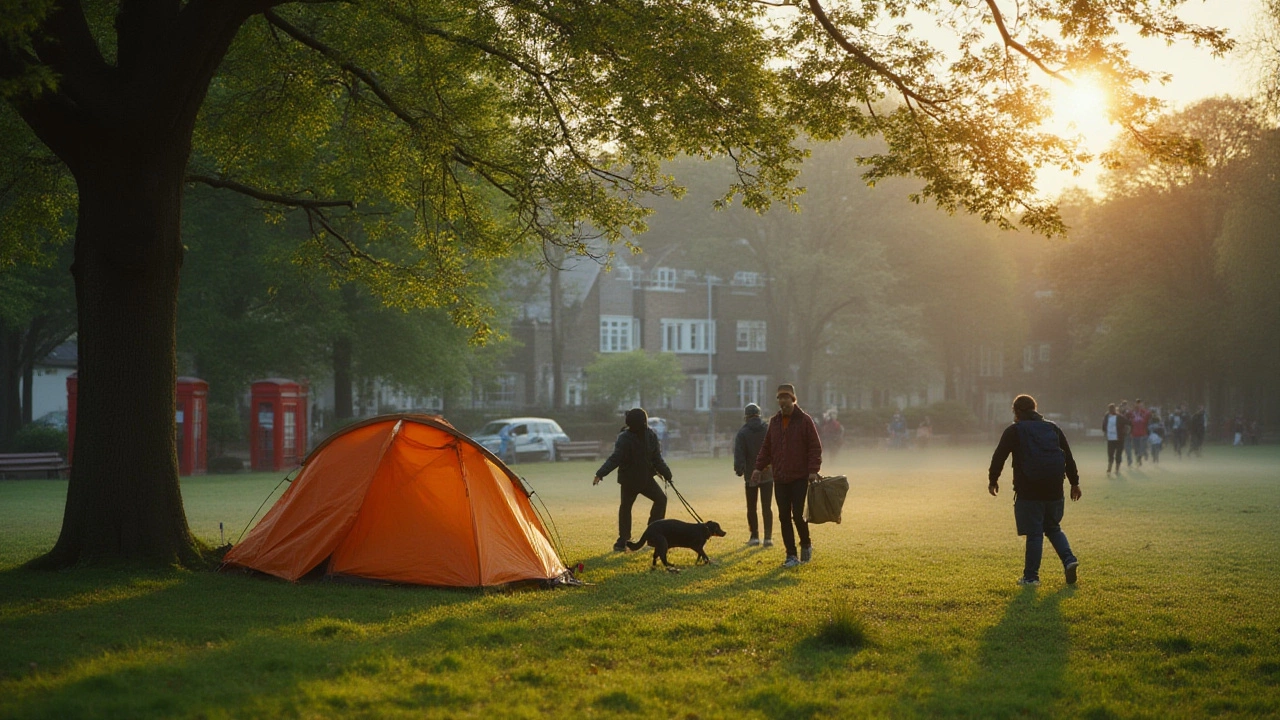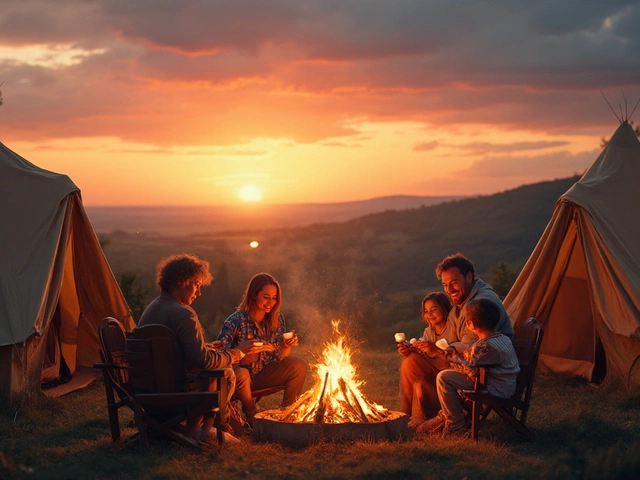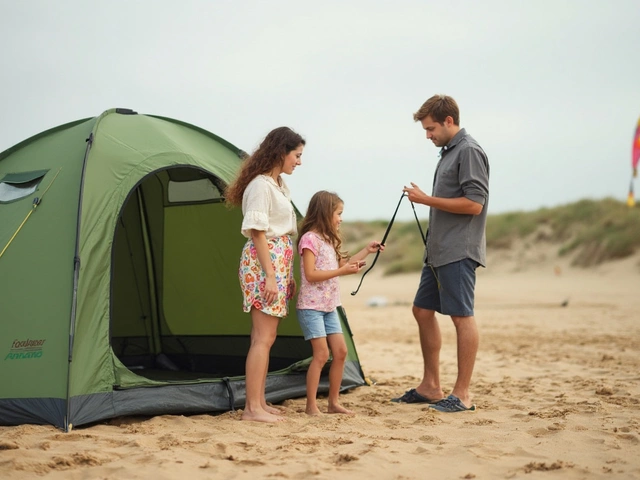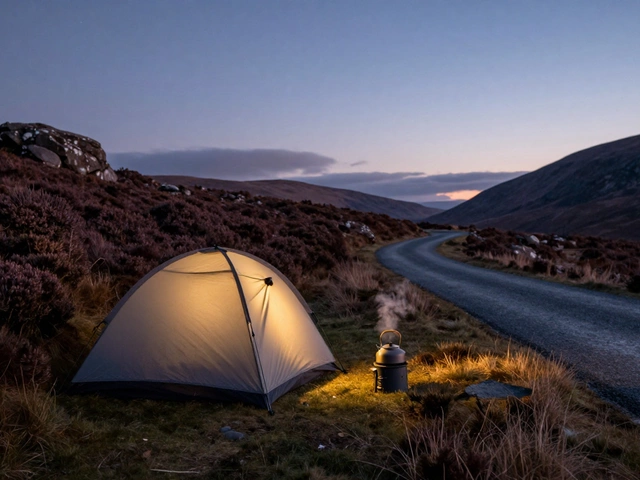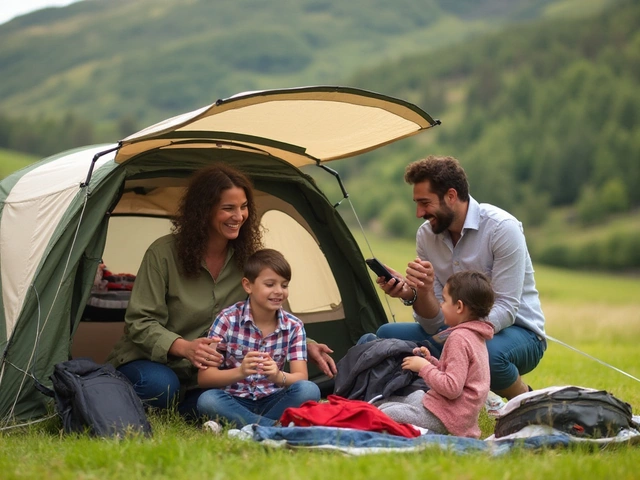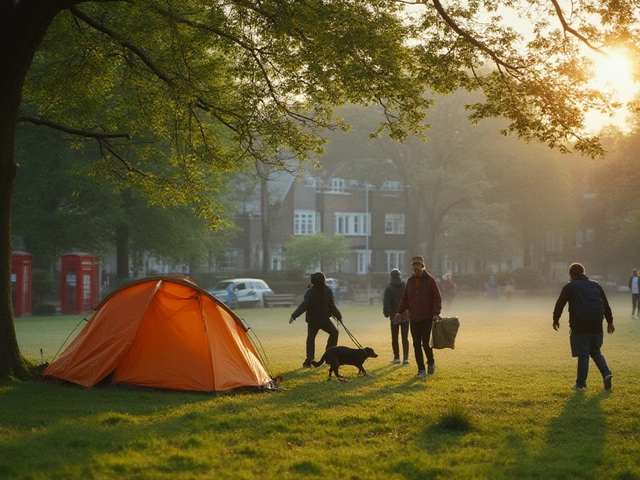Pop up a tent in a London park for the night and you might think you’ve found an urban slice of wild freedom. But wait—are you actually allowed to? If you ask ten locals, you’ll get at least five conflicting stories. Some say thousands of people stealth-camp every year, others warn about getting literally nudged awake by a police officer and handed a fine at sunrise. So what’s the deal—can you legally put up a tent in a public park anywhere in the UK, or is it always a ticket to trouble?
Understanding UK Law & Local Bylaws on Camping in Public Parks
First things first, there's no straightforward yes or no answer because it all boils down to who owns and manages the park. In the UK, every patch of parkland has rules shaped by its local council, trust, or governing body. The general rule of thumb? You can’t just legally pitch a tent overnight in a regular public park anywhere in England, Wales, or Northern Ireland—unless you have permission. Scotland's a different beast (more on that soon).
Most city parks in places like London, Manchester, Birmingham, or Liverpool flat out prohibit camping under local bylaws. These rules have some serious teeth: they can range from quiet warnings to fines (normally about £80, but it can shoot up for repeated offenses) or even police involvement under the 1824 Vagrancy Act. You’ll often find parks with signs reading “No overnight stay” or “No camping.” But that doesn’t stop some rule-breakers, and, honestly, enforcement varies wildly depending on the town and time of year.
You do get the odd council or charity with special camping nights or fun charity sleep-outs, but those are rare exceptions—and always need pre-booking with strict rules. If you’re thinking a quiet little tent won’t get spotted, keep in mind that UK city parks usually close at night. Rangers or security regularly patrol the area, especially in the summer or after big events.
So where did all those stories come from about festival campers taking over city parks? They’re usually about one-off permissions, like Glastonbury or London’s Hyde Park on New Year’s Eve (which even then comes with red tape and ticketing).
The closest thing to a legal loophole is in Scotland, thanks to the Land Reform (Scotland) Act 2003. This act lets folks wild camp on most unenclosed land, including certain lochsides and hills, but still not community parks, gardens, or sports fields in town centers. The Borders have started to tighten things up too, especially around Loch Lomond (where you’ll need a special paid permit now).
In short: want to put up a tent in a UK public park for the night? You’ll need written permission, and that’s usually not handed out lightly. Trying it secretly is a gamble—the rosy stories of hassle-free urban wild camping aren’t the norm, legal-wise.
Why This Rule Exists: Safety, Parks Preservation and Public Use
It’s easy to grumble when you see bench sleepers or big empty lawns, wondering, why not just let people quietly camp? But there’s actually quite a bit going on behind the scenes. The big one is public safety. Parks are made for everyone—from early morning runners and dog-walkers (yep, that’s me with Rex in Sydney), to grandkid-toting pensioners and couples on picnic rugs. Tents at night can hide things park security can’t see, from the innocent to the not-so-great.
There’s also wear and tear. Even lightweight camping messes up grass after just a few nights if enough people try it. Leave-no-trace is the golden rule for wild campers, but it’s hard to enforce when people nip out at dawn before the parks open to the public. Some councils estimate the cost of picking up after illegal campers (from cans to fires to tent pegs left in lawns) runs into six figures every year.
And the other reason behind keeping parks tent-free? Fairness in public spaces. If you let camps pop up, you can quickly end up with mini tent villages—think of what happened in touristy cities in the 2010s, when protests turned into long-term encampments. Many parks also run programs for kids, fitness, and events, so a random tent can really get in the way.
At the end of the day, parks in the UK aren’t lawless stretches of wilderness. They’re managed urban spaces. That’s why you’ll get quicker council action if you throw up a tent next to a kid’s playground than if you snooze under a bush in the far corner—visibility matters as much as rules do.

Where You Can and Can’t Put a Tent: Council Parks, National Parks, Commons, and Green Spaces
The options for campers who want to spend the night outside but still be legal aren’t all closed off. Here’s a quick run-through of what’s allowed and what definitely isn’t, broken down by different spaces:
- Council-Managed Urban Parks: Pretty much always a no for tents unless a sign specifically says otherwise or you have a written permit. Locked at night and patrolled after closing hours.
- National Parks (England, Wales, Northern Ireland): You can walk and picnic freely, but overnight camping (even with tiny pop-up tents) is banned unless in marked campsites. A few national parks like Dartmoor used to let wild camping fly, but now it’s mostly permission-only, and there’s been a battle with local landowners about it all year. The camping map is shrinking.
- Commons and Village Greens: Rules depend on who owns and manages the land. Big green spaces like Hampstead Heath in London are a no for tents, especially overnight.
- England and Wales Wild Land: Wild camping is technically banned on most land unless you get landowner permission. Exceptions happen in extremely remote areas (West Penwith in Cornwall, parts of the Lake District, Snowdonia) but you should always check.
- Scotland: The outlier! Wild camping is broadly legal thanks to the Scottish Outdoor Access Code, as long as you’re respectful, leave no trace, and avoid “built-up” areas, sports pitches, and playgrounds.
Around the country, there are thousands of registered and pop-up campsites near urban parks. These offer pretty much every level of comfort from wild pitches to glamping, all totally above board and safe from dawn police nudges.
| Location Type | Overnight Tents Allowed? | Need Permission? |
|---|---|---|
| Council Park (England/Wales/NI) | No | Yes |
| National Park (England/Wales/NI) | No (except campsites) | Yes |
| Common Land/Village Green | Rarely | Depends |
| Scottish Wild Land | Yes (with code) | No |
Wild camping guides recommend you always contact the local council if you have any doubts—even if you’re planning a one-man tent night out for charity or a quirky anniversary date. The answer will usually be a polite “No,” but sometimes you get pointed to a nearby wild area or pop-up meadow with permits.
The Reality of Stealth Camping: Risks, Stories and What Really Happens
Let’s be real: the temptation to try a “stealth camp” in a city park is strong for many people, especially after watching YouTubers make it look easy and low risk. Some even post videos from London parks or describe magical nights on the edge of Newcastle. What they often leave out? The hundreds who get moved on, fined, or worse—have tents nicked or stuff vandalized by nighttime visitors. Urban parks can get lively after dark.
Enforcement depends a lot on where you are. In rougher urban areas, park security, council rangers, or community officers are much more likely to move you on quickly. The park regulars know the usual faces; a random tent is pretty obvious, no matter how good your camo game. I’ve chatted to a few Brits who got away with it for one night—hidden in brambles, gone by dawn, zero trace left. But the odds aren’t in your favor if you try it repeatedly. Get caught more than once in the same council area, and you might face a fine, not just a warning.
Park security is also ramping up in urban areas. Some cities started using thermal cameras and extra staff after lockdowns saw so many folks taking their tents outside when travel was banned. In some towns, you’ll even get moved on in daylight for pitching up, not just at night. Then there’s the social side—local regulars or dog walkers aren’t always as chill as you’d hope. Packs of teens, city wildlife, late-night partiers, or just the unpredictable British weather can all add to the challenge.
Another factor? Homelessness. In cities, there’s been a crackdown on “unauthorized tent encampments” after increases of rough sleeping. Councils don’t love blurring the line between adventure-seekers and folks who genuinely have nowhere else to go. Reports show that in 2023, large London boroughs cleared tent encampments from public green spaces every few weeks—reminders that tent camping in parks just isn’t legal or safe without permission.
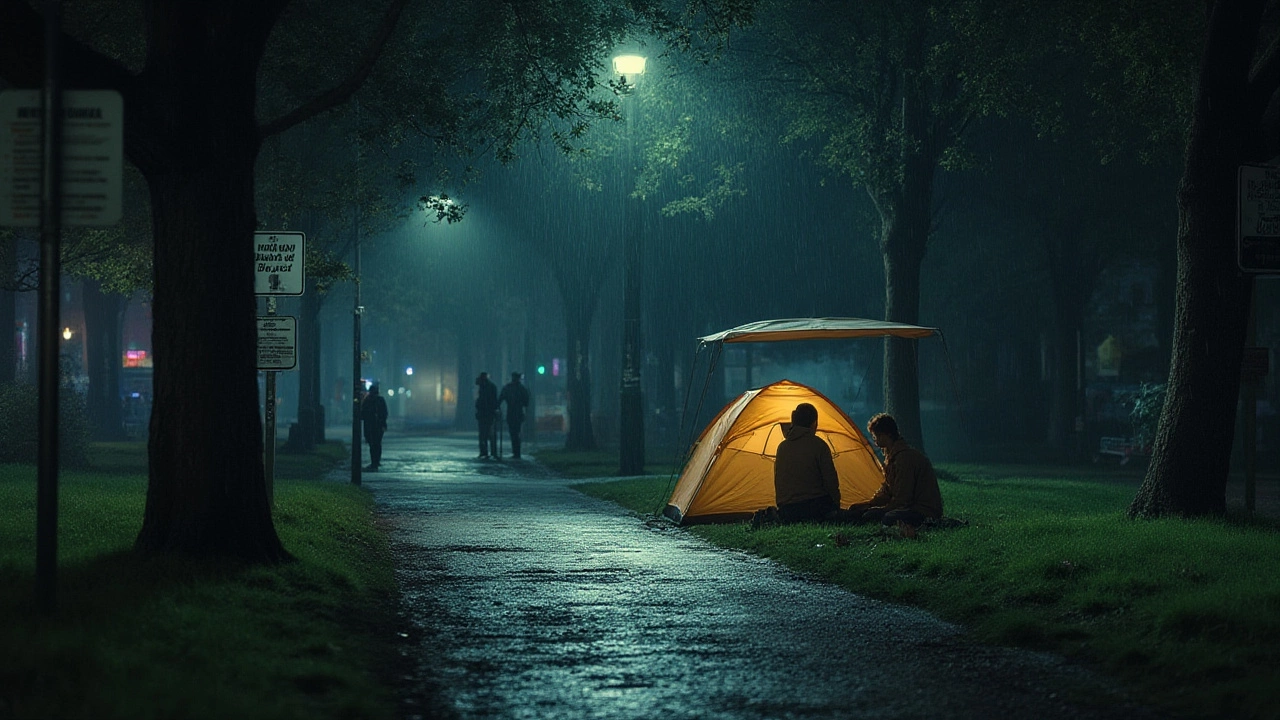
What To Do Instead: Legal Alternatives, Best Practices and Top Tips
If you’re itching to sleep outside but want to keep it legal, the UK has tons of beautiful spots that welcome wild campers with open arms—or at least, not with a fine. National parks like the Peak District, Snowdonia, or the Lake District offer wild-style camping on small, permitted areas. Or you can check out the huge growth in “nearly wild” campsites popping up everywhere—meadows or farmers’ fields just outside towns, often with zero facilities for the true back-to-nature feel.
If you really want the urban experience—think waking up under the skyline—look out for rare pop-up events run by park trusts or charities. Sleeping under the stars in Battersea Park during charity sleep-outs is legal and comes with security and a sausage sizzle. Or keep an eye on Airbnb and similar platforms for urban glamping, which sometimes uses rooftop yards or gardens legally.
Here are my best tips if you want a drama-free outdoor night in the UK:
- Want the real wild camping vibe? Try the Scottish Highlands or remote parts of Dartmoor (double-check for changes). Read the UK Outdoor Access Code before you go.
- For city camping, search for registered campsites on the edge of urban areas; some even have direct paths into parks for those morning strolls.
- If you really must sneak a nap somewhere, use a bivvy bag instead of a full tent, stay away from well-lit main paths and playgrounds, and always leave no trace.
- Dog owners: UK park rules for pets are strict, but some campsites love dogs and you’ll avoid those council grumbles (and fines). Don’t risk your dog’s safety in a city park after dark.
- Moving on early (by sunrise) and cleaning up every scrap is non-negotiable for stealth campers—but remember, you’re still at risk of being moved on or fined.
Always double-check the latest local rules—councils post updates after big summer events or if complaints spike. Use the National Parks UK or council websites for official advice. And for something extraordinary—how about a weekend at a treehouse or a “garden sleepout” fundraiser for Shelter?
There’s no denying the thrill of the forbidden, but genuine outdoor magic comes with a clear head, no run-ins, and a decent night’s rest. Save your city park wanderings for daytime adventures—and when you really crave that night under the stars, take it to wild-friendly hills or a welcoming campsite. You’ll enjoy it ten times more, and you won’t have to keep one eye open for the ranger’s torch.
